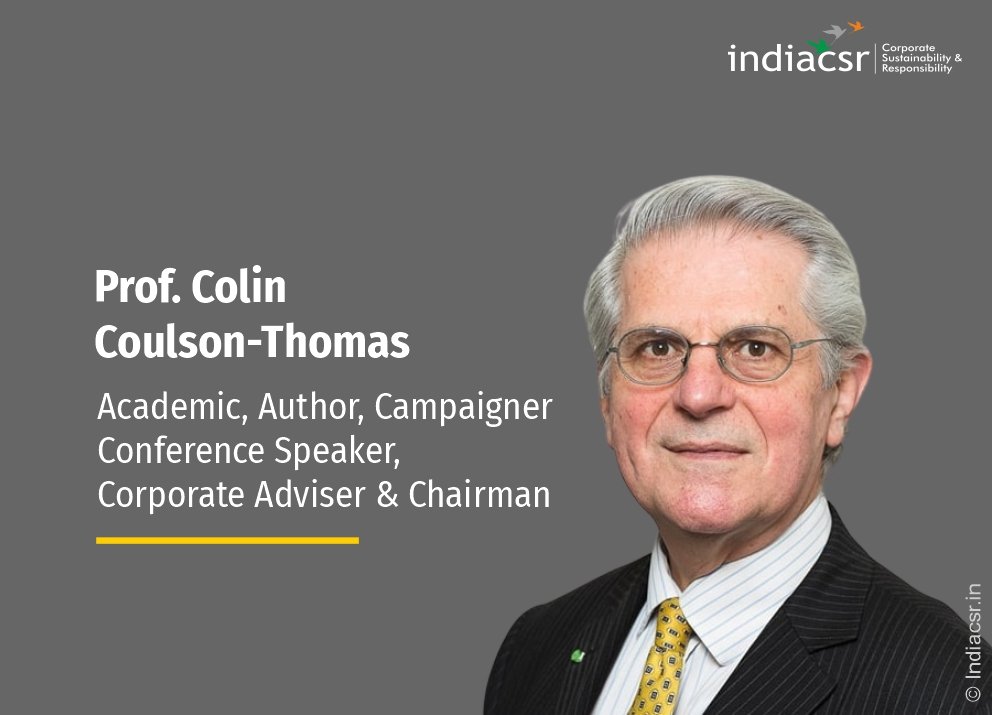The theme of this year’s London Global Convention organised by India’s Institute of Directors is the board’s transformational strategy for building a sustainability paradigm. Are some corporate boards providing any form of proactive leadership let alone transformational leadership?
Too many boards just react to events and they often react when it is too late. Look at what is happening to many retail chains. Their directors have been so slow to respond to on-line shopping. In recent years, some have even renewed long-term leases on stores in dying high streets.
Our least awake and aware people end up on certain corporate boards. What value do some of them add? Are many directors and the boards on which they sit no longer fit for purpose?
Once upon a time, annual calendars of meetings and board practices allowed many boards to deal with discrete issues as and when they arose. For some directors, being available to address self-contained issues that cropped up between annual meetings of shareholders was a justification for their existence and role.
The departmental structure of companies meant that issues could be categorised and routed to appropriate specialists who could handle them with or without intervention from the board, while others carried on the general work of the organisation.
Over the years the concerns of business leaders attending IOD conferences have changed. The changes have implications for directors and boards, their practices and the strategic direction they provide. They have consequences for how companies should operate and be structured and governed.
Conferences that used to be mainly self-contained have become more integrated. Certain topics now feature in multiple events. There are a growing number of overlaps. Certain common issues have also been on the radar for some time and action to address them is now overdue.
As issues become more complex, inter-related and significant in their possible implications, their categorisation can be more problematic. Addressing them may require a multi-disciplinary approach. It might also benefit from references to shareholders or other stakeholders such as creditors.
Corporate leaders portray a business environment of change, uncertainty and insecurity. Boards are simultaneously confronted with multiple and inter-related challenges and, at the same time, new and unprecedented opportunities.
Because issues may have implications across a company, identifying which individual, group or department should address them is difficult. Some remain at board level because there is no obvious group to whom they can be delegated.
Few people appear to have authoritative and relevant expertise and few organisations offer compelling and actionable solutions. Business leaders find that their colleagues’ past experiences and current corporate capabilities, approaches, structures and practices may not be relevant for today’s requirements and tomorrow’s possibilities.
Climate change, cyber risks and the challenges and opportunities of digital technologies, new business models and the sharing and circular economies can impact upon most companies. Addressing them can benefit from a collective response. However, there is more recognition of the value of collaboration, than understanding of with whom and how it might best be achieved.
The scale and potential impact of some threats and opportunities is such that more boards are recognising responsibilities to a wider range of stakeholders. A broader range of interests may need to be engaged, but to build mutually beneficial relationships one might first need to restore trust.
Many companies are perceived as compounding problems rather than developing solutions. Tackling a challenge such as climate change or sustainability requires more than the incremental improvement of current operations. Innovation and transformational leadership are needed.
Many organisations retain departmental structures. Their people specialise in relatively narrow and self-contained areas. In business, academia and the professions some leaders struggle to find the breadth of perspective and dispassionate objectivity required to simultaneously address inter-dependent and multi-disciplinary issues.
Will complacency, compliance, departmentalism and risk aversion prevent the creativity, innovation and entrepreneurship that are required? Will vested interests frustrate transformational leadership and prevent paradigm change?
Clinging to standard models and approaches developed in a previous era can inhibit the exploration and diversity required to develop adaptable and flexible solutions for particular situations at a certain stage of development and in a changing context. Given the multiplication of opportunities and options and the requirement for a greater variety of approaches we may need more guidelines and fewer standards.
Breakthroughs and paradigm shifts can depend upon challenge, experimentation and vigorous debate. They are not helped by the cosy consensus, groupthink, safe spaces, political correctness and social conventions that sometimes lead to a dull conformity. Many people are simply resigned to enduring issues and a continuation of trends.
The dilemma is how to encourage questioning, creativity, innovation and enterprise while complying with requirements dating from an era when different concerns and priorities applied. Could conformance to out-of-date rules designed to protect people actually prevent innovations that might benefit them? At the same time, do some laggard companies only act when there is a threat of legal or regulatory action?
Are our board, governance and regulatory practices capable of handling a collective response to inter-related challenges such as climate change and sustainability that may have multiple implications for different groups over varying timescales? Who now needs to be involved? How do we build the understanding and develop, approve and implement the responses required?
Many companies would benefit from a fundamental review of their governance arrangements, board and management practices, and business and organizational models. Thereafter, they and corporate policies and guidelines should be periodically reassessed.
Traditional board activities such as making choices, setting priorities and reconciling contending stakeholder interests may still be required. In many companies however urgent action is needed to develop or acquire multi-disciplinary and complex and inter-related problem solving competencies.
More issues may need to be handled by multi-disciplinary, multi-location and multi-organizational working parties, project groups and programme teams. Their effective management and governance might benefit from the use of relevant digital technologies.
More systems thinking is required in corporate boardrooms and in support of boards to better understand and map interdependencies, identify points of greatest potential impact, agree on warning signs or ‘traffic lights’ and establish control limits.
It may be feasible to identify areas for action that might interrupt or moderate certain interdependencies and their impacts. It may also be possible to model some systems that at first sight seem excessively complex and/or use scenario planning.
Greater attention could be given to more affordable, quicker and less disruptive approaches to change, knowledge and talent management and ways of helping people to cope with complex challenges and simultaneously deliver multiple objectives.
Some boards clutch at straws. With a degree of arrogance and a touch of hypocrisy it has become fashionable for some business leaders and consultants to suggest that other people’s values need to change because of behaviours caused by their own priorities and their promotion, remuneration and other policies. They should first look at themselves.
Boards should question whether they and senior management are providing ethical, inspirational and transformational leadership. Are they doing enough to stimulate, support and enable creativity, innovation and entrepreneurship? Do they have the openness, flexibility, intellectual ability and energy to confront complex and inter-related issues?
————–

(About the Author: Prof. (Dr) Colin Coulson-Thomas, President of the Institute of Management Services, has helped directors in over 40 countries to improve director, board and corporate performance. In addition to directorships he leads the International Governance Initiative of the Order of St Lazarus, is Director-General, IOD India, UK and Europe, chair of United Learning’s Risk and Audit Committee, Chancellor and a Professorial Fellow at the School for the Creative Arts, Honorary Professor at the Aston India Foundation for Applied Research, a Distinguished Professor at the Sri Sharada Institute of Indian Management-Research, Visiting Professor of Direction and Leadership at Lincoln International Business School, and a member of the advisory board of the Aravind Foundation and ACCA’s Governance, Risk and Performance Global Forum.
An experienced chairman of award-winning companies and vision holder of successful transformation programmes, Colin is the author of over 60 books and reports. He has held public appointments at local, regional and national level and professorial appointments in Europe, North and South America, Africa, the Middle East, India and China. He was educated at the London School of Economics, London Business School, UNISA and the Universities of Aston, Chicago and Southern California. He is a fellow of seven chartered bodies and obtained first place prizes in the final exams of three professions.






















